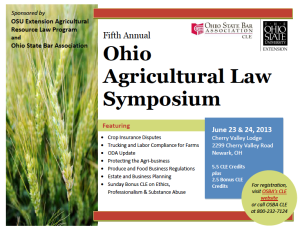by: Larry Gearhardt, OSU Income Tax School Director
With the end of the school year, many students will be heading home for the summer. The additional help on the farm will be welcomed. Most times the help is free. After all, you provide free room and board, right? But there may be tax advantages, at least from a family perspective, if you “hire” your children to work in the family business.
INCOME SHIFTING: Regardless of how a business is organized, its owners may be able to shift some of their high-taxed income into tax-free or low-taxed income by employing their children. For the children’s wages to be deductible, the work done by the children must be legitimate and the wage must be reasonable for the work. The standard deduction for an individual is $6,100 in 2013. This means that your child can earn up to $6,100 before he/she incurs any tax liability. The amount that you pay your child reduces the parent’s income which is taxed at a higher rate.
ILLUSTRATION: Let’s say that Fred Farmer, who happens to be in a 33% tax bracket, hires Fred Jr. to work on the farm for the summer, and pays him $6,100. If that $6,100 had remained with Fred Farmer, he would have paid $2,013 in taxes. Instead, Fred Jr. receives the money tax-free because of his standard deduction. The family unit saves money. Even if Fred Jr. earns more than $6100, family taxes are reduced because Fred Jr.’s beginning tax rate is 10% instead of the 33% paid by his father.
CAUTION: The tax code contains a provision known as the “kiddie tax.” This provision applies to unearned income on investments. It is meant to guard against parents transferring high earning investments to their children so that the unearned income will be taxed at a lower rate. The kiddie tax applies to the child if he/she does not file a joint tax return and (1) hasn’t reached age 18 before the end of the tax year, or (2) his/her income doesn’t exceed one-half of his/her support and the child is 18, or is a full time student age 19-23. The kiddie tax says that the tax rate on the child’s unearned income over $2,000 will be taxed at the parents’ highest tax rate. This provision applies only in the event that the child’s unearned income exceeds $2,000. The kiddie tax only applies to unearned income and has no effect on the child’s wages and other earned income.
RETIREMENT SAVINGS: If the child is paid more than his/her $6,100 standard deduction, additional savings are possible if the child deposits the extra earnings into a traditional IRA. For 2013, a child can make a tax-deductible contribution of up to $5,500 to his/her own IRA. The result of the combination of the standard deduction and the IRA contribution is that the child can earn up to $11,600 in 2013 without paying income taxes. Fred Farmer’s tax savings is now $3,863.
EFFECTS ON THE BUSINESS
INCOME TAX WITHHOLDING: Regardless of how the business is organized, it should withhold federal income taxes on the child’s wages. This means that the child should complete a W-4 form for 2013. There are some exemptions from withholding federal income tax for a business, however, they are minor exemptions that more than likely will not apply here. Instead, it is recommended that the business play it safe and withhold federal income tax, keeping in mind that the child probably will get a refund of all or part of the taxes paid if he/she files a return for the tax year.
FICA (Medicare): Employment for FICA tax purposes does not include services performed by a child under the age of 18 while employed by a parent. This can generate some additional savings for a parent who runs an unincorporated business, including a partnership that consists of both parents and no other partners. A parent can save 2.9% on the amount of wages paid to a child under 18. This savings does not apply if the child is age 18 or over, if the business is incorporated, or if a partnership includes partners other than the parents. In these instances, the child should be treated the same as any other employee.
FUTA (federal unemployment tax): A similar but more liberal exemption applies for FUTA, which exempts earnings paid to a child under age 21 while employed by his or her parent. The FUTA tax is 6% on the first $7,000 of wages. A credit for state unemployment tax paid is allowed up to 5.4%. Once again, this exemption does not apply to incorporated businesses or partnerships that have partners other than the parents.
More detailed information can be found at irs.gov, Publication 15 (Circular E) Employer’s Tax Guide.
